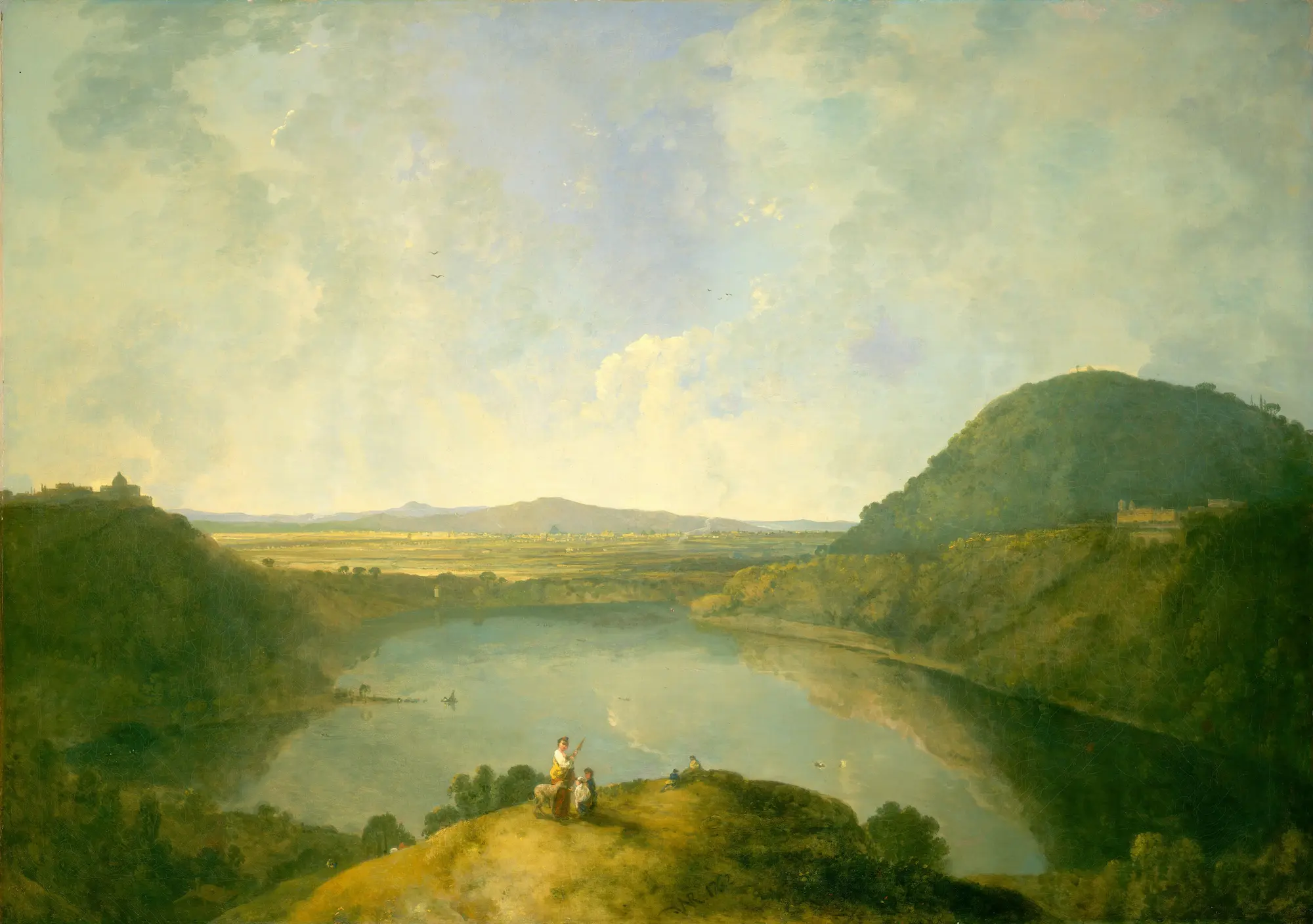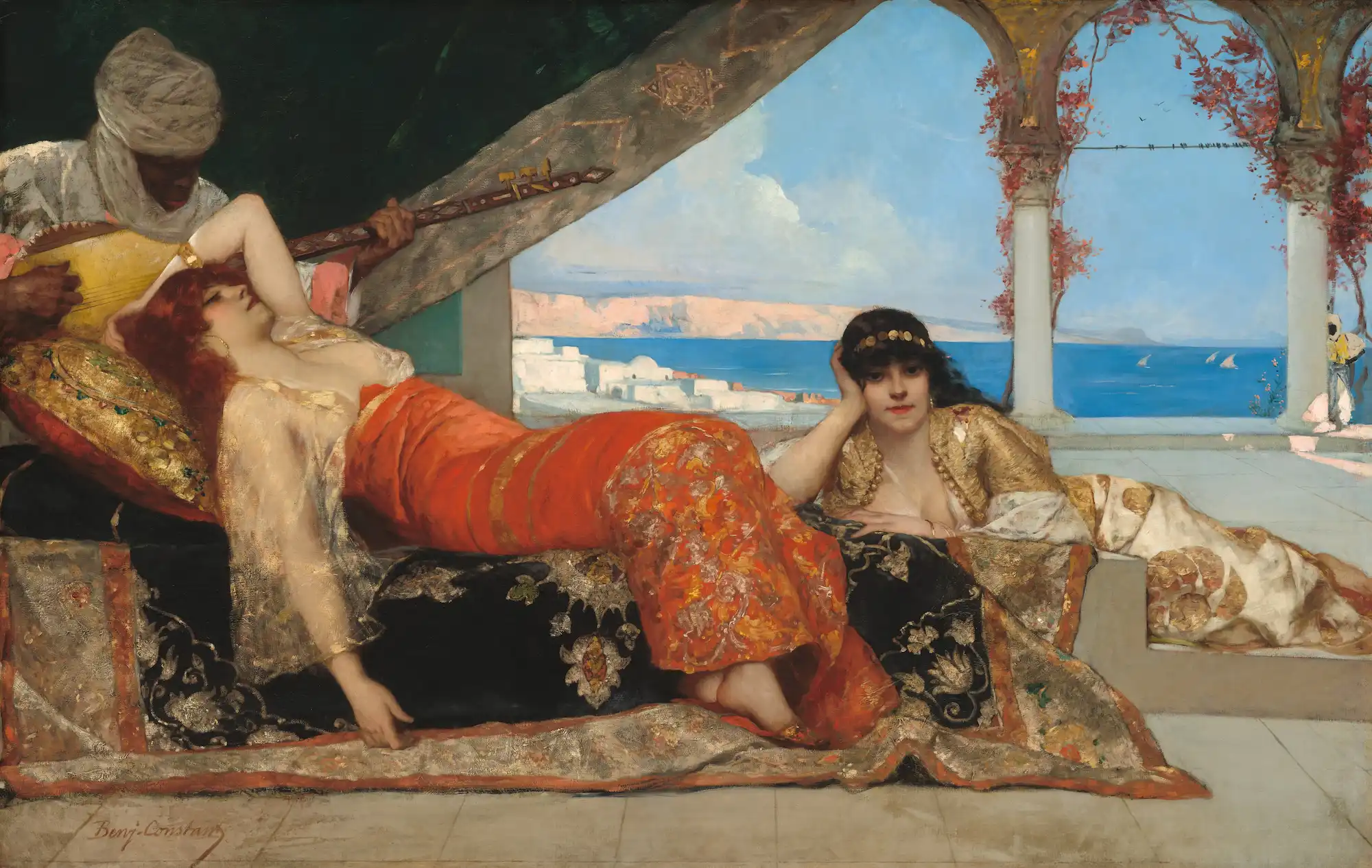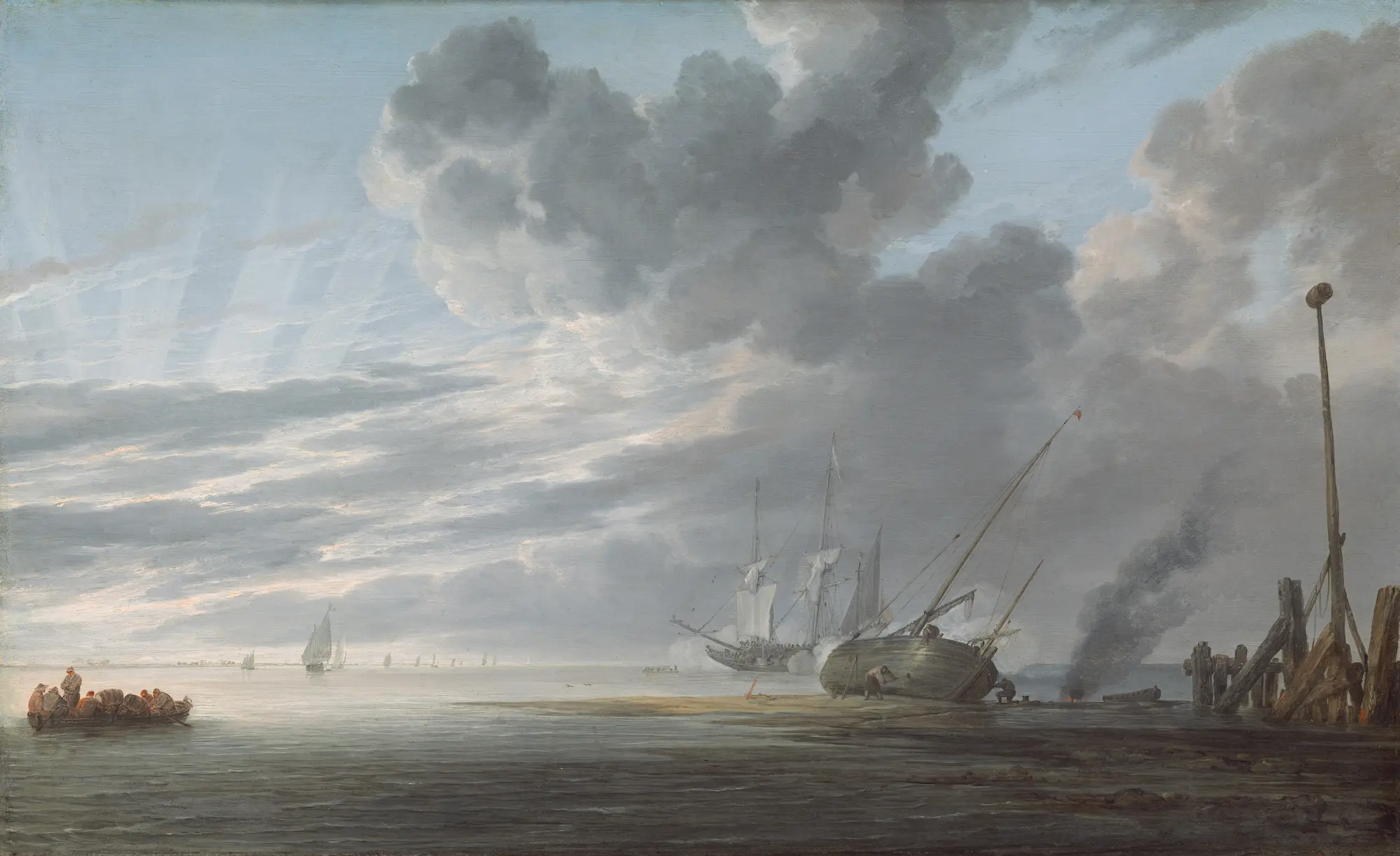
Lake Albano, by Richard Wilson
Quentin Compson Time
I took the truck down the rough, narrow trail, rounding the final rutted bend out of the woods and onto the rocky beach surrounding the lake. Engine off. Got out, stretched, and delighted in that stretching. The sun squeezed its way through the branches at my back, drawing shadows on the hill at the other side of the water. Little waves like razor swipes ran up to the rocks and disappeared. Being a wave looked so easy.
Someone had stacked two columns of flat rocks a little more than a yard apart. I sat down between them to think about Craig. To think about the state of my life. To think about the theories of Lanza and Berman. To think about Quentin Compson.
But the thinking had barely begun when another vehicle came down the track. This one wasn’t a truck but an ordinary car bouncing across the ruts like a metal sack of potatoes. I could hear portions of the suspension lift while others dropped, nulling out the bottom with the sound of much, much financial damage.
A dirty white Camry with Mississippi plates appeared. Followed by a thin man in jeans, red flannel shirt, and black vest. He was followed by the most beautiful golden retriever I’d ever seen. Sand colored with orange highlights like the sun setting on a California beach. The man stepped up to me and sighed. The golden retriever planted himself regally between us just on the other side of the left-hand column of stones. He sat spine-straight, contemplating the lake.
“Glynn,” the man said pointing to himself. Then pointing to the dog, “Hermie.” I introduced myself with the first name I could think of -- William.
“You up here taking in the scenery or you been camping?” “Actually, I’m sitting here thinking.”
“Quiet time. I like that. I myself took a left turn out a ways back in Abbeville.” I told him I didn’t know a town around here named Abbeville.
“Abbeville, Mississippi.”
“You realize you’re in West Virginia?”
“Yup. Told Eleanor I was taking Hermie for a drive around four yesterday afternoon. She won’t care about me being gone, as she made it clear it was time for me to leave anyways. She might miss Hermie though. But Hermie’s the kind of dog that only goes with folks he senses value in. He likes you, he’ll never leave your side. He don’t like you, he won’t budge. So when we got back to the driveway, and I said ‘Hermie, you want to go in and see Eleanor?’ he gave a sort of whine. Not much of a talker this dog.” Unlike his owner. Hermie also seemed to pick up on social cues. The dog hadn’t moved.
I envied its steadiness and singularity while I was trying to deep-breathe my way through the irritation of this time being derailed.
“I said I didn’t want to go in and see her either, so how about you and me going for an all-night drive? Damn if that dog didn’t sit up in the passenger seat just as he’s sitting now while I backed out and turned left. Stayed that way, too, except for the sleep he caught for a few hours after midnight. I just drove this highway and that until I got here and told Hermie I needed to see some nature. Took a few roads, figured I’d hit a good spot eventually, and here we are. What are you thinking about?”
“Excuse me?”
“Thinking. What are you contemplating? Or you just here for the silence?”
I examined him for the possibility that his question contained even a shred of irony. Sadly not.
“The theories of Lanza and Berman. In the book Beyond Biocentrisim.”
“Read it. No real space and time. The perceiver affects and possibly creates the perceived. The energy of consciousness makes birth and death insignificant, just parts of a now that can never really be destroyed. Anything else?”
I heard myself say it. “Craig.”
“Craig? He your lover?” My face must have registered surprise because Glynn leaned away, pointing an accusing finger back at me. “Don’t be intolerant. Not all southerners are racist homophobes like you northerners think.”
I breathed away the urge to tell him West Virginia was a southern state. “My son.”
“Okay then,” he said as if some point had been settled. He plopped himself down on the other side of his dog and crossed his legs into a half-lotus posture, whereas I was sitting with my arms circling my knees. “Let’s do this.”
Fine. If this dude drove from Mississippi to a spot in the hills of Nowhere, West Virginia, seemingly at random, only to push his way into the private thoughts of another man so lost he didn’t know which way was which anymore, then fine. He could be from Yoknapatawpha County for all I cared. Let Glynn the Mississippian stay, and if I couldn’t find some kind of answer in the most serene place I know, then Glynn’s welcome to see -- I looked at my watch; 8:03 looked back at me -- what would become the Quentin Compson show 72 minutes from now.
Glynn’s meditation technique wasn’t as well-developed as Hermie’s. He shifted, grunted, “yupped” to himself a couple of times, and made short comments about the lake, the air, the trees as if he’d never seen any of those things before. So, I had to struggle with myself to concentrate. I focused on the opposing hill and found myself leaning a bit toward Hermie. That dog remained as rigid as the rock pile beside him.
The minutes melted away and Glynn finally stopped yapping, so I was able to get back on track. That phrase made me smile. I hadn’t been on track since December 14, 2012. The day Geeter, which is what I called Craig, was shot by a different guy named Lanza at Sandy Hook Elementary school in Connecticut. Violence is like the waves on a lake; its repercussions aren’t huge but they keep on coming, long after the media and the people turn away. Those repercussions live in your head, where they grow and fill up the unknown crevices in your life. Even here in West Virginia. A world away.
Pre-Sandy Hook, I was a voracious reader. I read without prejudice. I read every spare moment. And for one hour during every evening that I had custody of Geeter, I read to him. Not children’s books but the classics. He wouldn’t understand them, but that wasn’t the point. I wanted him to absorb the rhythm of words, the pure beauty of language, so that he would either be a reader himself or, if he turned away from reading because his father was such a freaky geek about it, the language would stay inside him and no one would ever be able to take it away. No one would ever be able to take it away. I started “The Classics Hour” when he was four. He got two years before someone took it away.
Beyond Biocentrisim was the first real book I was able to read post-Sandy Hook. That was during the Covid-19 lockdown. I chose it because of Lanza’s name and the idea that what we see as life isn’t actually what’s going on. I’ve thought about that book for two years, re- reading and puzzling over it, looking for a way forward. But what have I learned that I didn’t know before about this side of existence? That my world consisted of four very close gray walls surrounding me no matter where I was. Except in this place. Here, there were three spectacularly pretty walls, and one open side. The only open side. The lake.
If you’re into literature and serendipity, then try this on for size: The book I read to Geeter on the evening of December 13, 2012, was The Sound and the Fury. I didn’t read the part where Quentin Compson goes into the Charles River at 9:15 pm, and if I wanted to be true to that text, I’d have done this at night, but I’ve always loved mornings. I looked at my watch: 9:02. I came here believing I could think of another option, that I could find another opening. But maybe serendipity is a real thing, and whatever makes serendipity work built the rock piles and sent Glynn the Mississippian just for this moment. Opportunity and witness. Like Lanza and Lanza. Both changed my life. One took it away, and one offered it back. Just in another form.
The decision being made, I spent the next ten minutes taking in the beauty of this place while wondering how Glynn was able to stay silent all this time. Perhaps the secret was keeping his eyes closed. Perhaps, after an all-night drive, he had fallen asleep. Hermie was wide awake, though. So, when my watch ticked over to 9:13, and I stood and started moving the flat rocks from the piles to my pockets, Hermie was the only one watching.
At 9:14, with my pockets full, I started for the lake. I thought I heard Glynn say something, but he was behind me now. His entire world was behind me now. My focus was fully on the water. I stepped into the lake, and I was up to my knees when my watch turned to 9:15. I kept going.
When the water reached my waist, three noises broke in from the three-walled world. The splash didn’t register with me as clearly as the revving engine. Both were followed by an ear- splitting howl in which I could detect a Mississippi accent. None of the three interested me enough to look back. I kept moving forward, anticipating the underwater shelf where I would, literally, drop like a stone to the bottom of the lake.
I heard Glynn call out, “Damn, William! See that?”
I didn’t turn to look because I didn’t have to. Coming into my peripheral vision was Hermie, doggie-paddling in Olympic time. I stopped and Hermie stopped. The dog side-eyed me as if to say, “Well? Are we going on, staying put, or turning back?”
Then I did look back. Not just this morning but nearly a decade ago. When Geeter died, I couldn’t cry. Shock, sure. Anger, yes. Depression and despair, well, given where I was standing both seemed likely. But not tears. Why that thought came to me while I watched Glynn’s tires shoot a stream of stones into the lake before his car bounced drunkenly toward the tree line, I didn’t know. The thought disappeared with the car around the bend.
Hermie swam in front of me and turned, still paddling and waiting. My pants sagged from the weight of the water and the stones. Suddenly, sobs. Wracking, rib-cracking sobs. No tears but a breaking open. Then a nudge against my front right leg and what I considered to be my first post-Sandy Hook thought, among this avalanche of the cascading internal destruction. I managed a hope that the nudge came from Hermie and not something living in that water. The nudge came again. The smallest of sensations, comparatively, but just enough to move me. One tentative step. Back.
December 10, 2024
Further considerations

Telling the Truth
I once told a therapist my father was molesting me. It wasn’t true. I was twenty-five and exhausted, lying awake most nights trying to understand why I felt so sad when nothing in my life was obviously wrong.

Thoughts of Endangered Paper
Here I am, looking at this copy of a // two hundred-dollar book.

this is about capitalism, and The Poet Sees Her Ex at Pride
duty pulled a mountain along lesser used roads. // time was ill-spent preparing workers for the crossing.
.jpg?alt=media&token=3b6b38c2-6a33-462e-a707-5089fd5a25bd)
good people on both sides, and running fingers through your hair, thin as feathers
My dear trees, I no longer recognize you // The storm puts its mouth to the house